Losing your teeth can be a devastating experience, impacting not only your appearance but also your ability to eat, speak, and smile confidently. While dentures and bridges have been traditional solutions for tooth loss, advancements in dental technology have brought forth a superior alternative: full mouth dental implants. This innovative treatment offers a comprehensive solution for individuals who have lost most or all of their teeth, restoring both function and aesthetics to their smile. In this article, we will explore the intricacies of full mouth dental implants, how they compare to other options, the process involved, the numerous benefits they offer, and essential considerations before undergoing the procedure.
What are full mouth dental implants?
Full mouth dental implants represent a revolutionary approach to replacing missing teeth, providing a stable and secure solution compared to traditional dentures. This advanced procedure involves surgically placing multiple dental implants into the jawbone, forming a robust foundation for a complete set of replacement teeth. These implants function as artificial tooth roots, seamlessly integrating with the jawbone over time.
The implants themselves are typically made from titanium, a biocompatible material that is well-tolerated by the body. This material promotes osseointegration, ensuring a strong and lasting bond between the implant and the jawbone. Once the implants have successfully fused with the bone—a process known as osseointegration—a customized set of prosthetic teeth is attached to them. The prosthetic teeth can be crafted from various materials, including porcelain, ceramic, or acrylic, depending on the patient’s specific needs and preferences.
The beauty of whole mouth dental implants lies in their ability to mimic the natural function and appearance of real teeth. Unlike removable dentures, which can slip during chewing and speaking, full mouth implants provide a fixed and stable solution. Patients often report a significant improvement in comfort and functionality, allowing them to eat a wider variety of foods without the limitations imposed by traditional denture options.
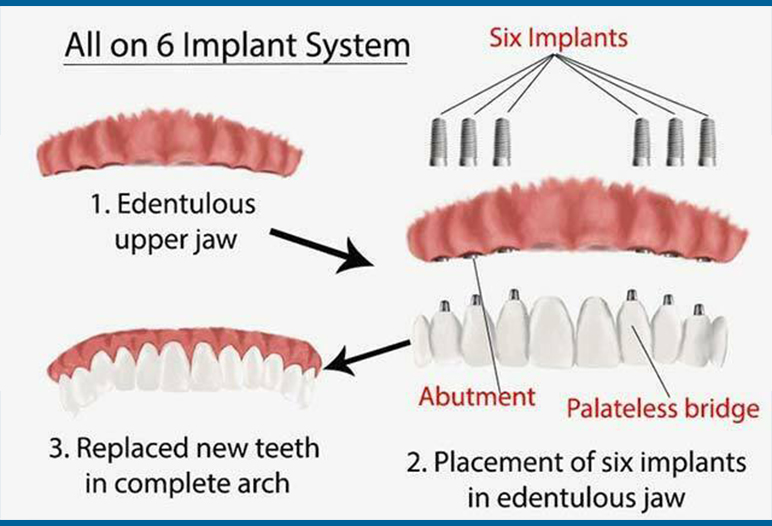
Understanding the components
To better appreciate the effectiveness of full dental implants, it is essential to understand the components involved in the process:
- Dental Implants: These cylindrical posts serve as replacements for tooth roots. They are inserted directly into the jawbone and provide the necessary support for the prosthetic teeth.
- Abutments: Once the implants have integrated with the jawbone, abutments are placed on top of each implant. These connectors hold the prosthetic teeth in place.
- Prosthetic Teeth: Customized to fit the individual’s mouth, these artificial teeth restore aesthetics and functionality. Their design can be tailored to match the size, shape, and color of natural teeth.
Advantages of full mouth dental implants
Beyond their structural advantages, complete dental implants offer several benefits over their traditional counterparts. For one, they help preserve jawbone density, preventing the bone loss that often accompanies tooth loss. This preservation is critical not just for oral health but also for maintaining facial structure and harmony.
Moreover, the stability provided by full mouth implants means patients can enjoy an unrestricted diet, indulging in their favorite foods without fear of discomfort or slippage. This freedom contributes to improved nutrition and overall well-being.
Full mouth dental implants vs other options
When considering tooth replacement options, it’s crucial to weigh the advantages of full mouth implants against other traditional methods such as conventional dentures, partial dentures, and dental bridges. Each option has its unique features, but full mouth dental implants stand out for several compelling reasons.
Conventional Dentures
Traditional dentures have long been used as a remedy for tooth loss, offering a removable solution that restores some level of function and aesthetics. However, they come with notable drawbacks:
- Comfort Issues: Many denture wearers report discomfort due to fitting issues, requiring constant adjustments. Additionally, the sensation of wearing something removable in the mouth can be unsettling.
- Slippage: There is a common concern among denture users regarding slippage while eating or speaking. This lack of stability can lead to embarrassment and reduced confidence.
- Bone Loss: Perhaps the most significant downside is that dentures do not stimulate the jawbone. Over time, this can lead to further bone loss and changes in facial structure.
In contrast, whole mouth dental implants securely anchor to the jawbone, promoting bone health and stability while providing a comfortable solution.
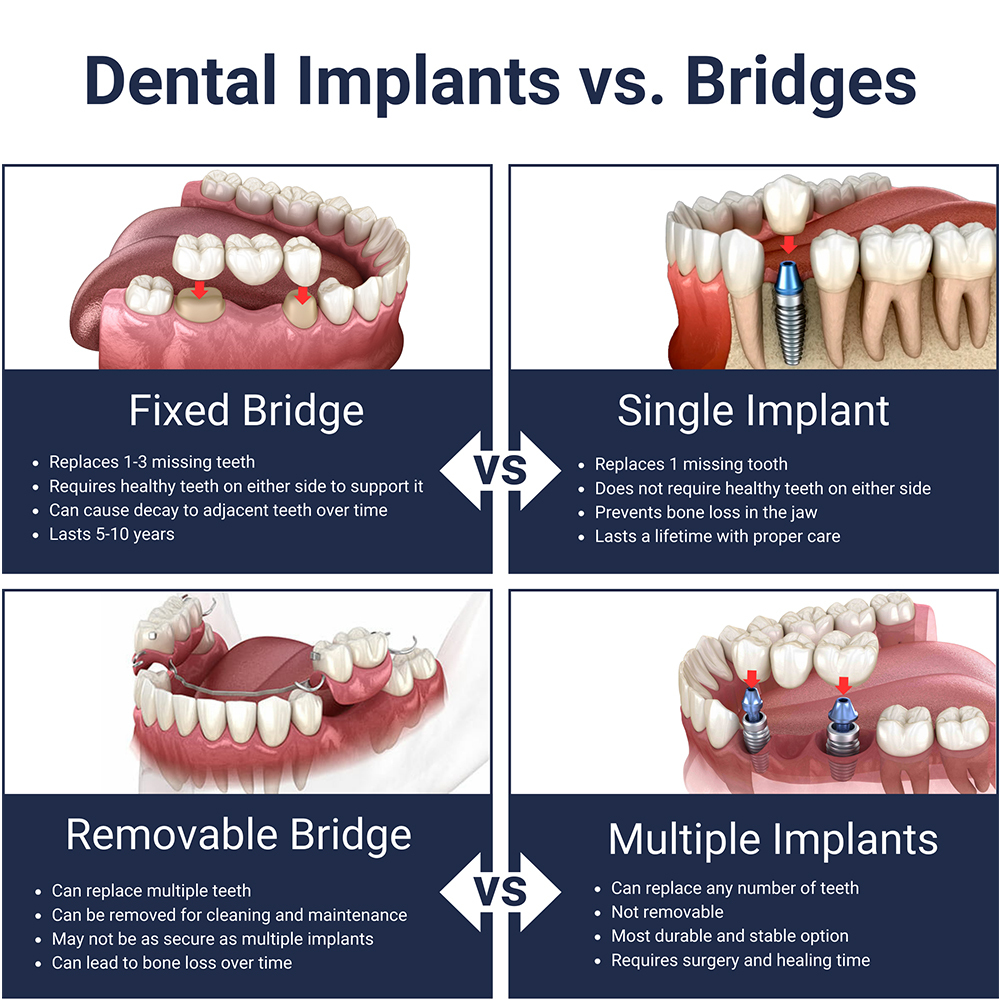
Partial Dentures
Partial dentures fill gaps left by missing teeth when some natural teeth remain intact. While they offer advantages over full dentures, they still present challenges:
- Maintenance: Partial dentures require meticulous cleaning to prevent decay in remaining teeth and the structures surrounding them. This need for extra care can be cumbersome.
- Discomfort and Fit: As with full dentures, partials may cause discomfort and require periodic adjustments to maintain their fit.
While partial dentures can be more secure than full dentures, they cannot replicate the stability offered by complete mouth dental implants.
Dental Bridges
A dental bridge consists of one or more artificial teeth anchored to adjacent healthy teeth. This method can be effective but comes with inherent risks:
- Preparing Healthy Teeth: One major drawback is that adjacent healthy teeth must be altered and crowned to accommodate the bridge. This preparation can weaken existing teeth and increase susceptibility to decay.
- No Bone Stimulation: Like traditional dentures, bridges do not stimulate the jawbone, leading to potential long-term complications such as bone loss.
Given these comparisons, it’s evident that full mouth implants provide a comprehensive solution that addresses many of the concerns associated with traditional options.
The full mouth dental implant process
Understanding the process of obtaining full mouth implants can demystify what can often seem like a daunting journey. It involves several stages, starting from initial consultation to the final placement of prosthetic teeth.
Initial Consultation and Assessment
The first step in your journey to a restored smile begins with a thorough consultation with a qualified dentist specializing in implant dentistry. This appointment is crucial for establishing a foundation of trust and understanding between patient and provider.
During the assessment, the dentist will perform a comprehensive examination of your oral health. This includes evaluating your medical history and assessing the condition of your teeth, gums, and jawbone. Diagnostic imaging such as X-rays or CT scans may be utilized to provide a detailed view of the jawbone structure, guiding the development of a personalized treatment plan.
This phase is invaluable as it allows the dentist to identify any underlying issues that may impact the success of the implant procedure. Whether you’re dealing with gum disease, insufficient bone density, or other oral health concerns, addressing these early ensures a smoother path forward.
Treatment Planning
Once the initial assessment is complete, a personalized treatment plan is developed. This plan outlines the number of implants needed, the surgical procedures involved, and the type of prosthetic teeth that will be used.
Treatment planning may involve collaboration with specialists such as oral surgeons or periodontists, particularly if additional procedures like bone grafting are necessary. This stage ensures that every aspect of the process is accounted for, reducing uncertainty and enhancing the likelihood of successful outcomes.
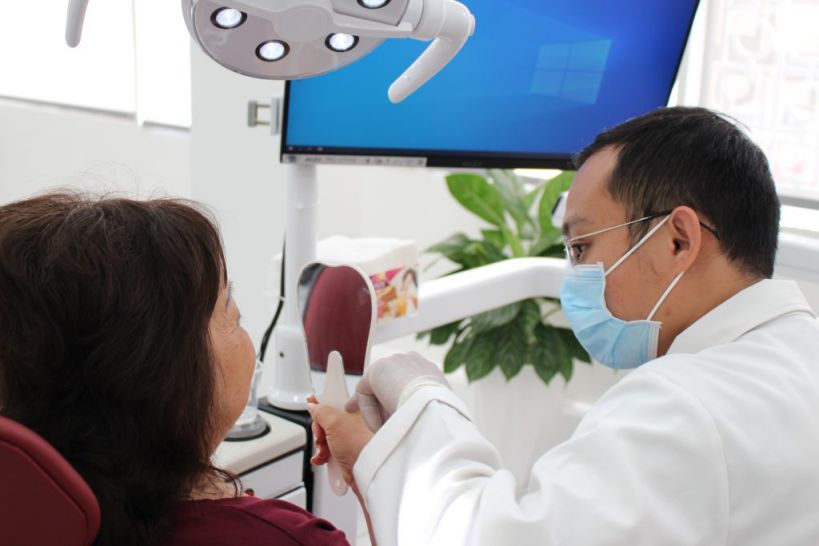
Implant Placement Surgery
With a clear plan in hand, the next step is the minor surgical procedure during which the implants are placed into the jawbone.
Under local anesthesia, small incisions are made in the gums to create space for the implants. The dentist carefully inserts the implants into the jawbone, ensuring precise positioning to maximize stability. If there’s inadequate bone density, bone grafting can be performed at this stage to enhance the jawbone’s strength and volume.
Following the placement of the implants, patients may experience some swelling and discomfort, which is normal and manageable with prescribed pain relief.
Healing and Osseointegration
After the surgery, a healing period is required for osseointegration—the process by which the implants fuse with the jawbone. This stage is critical for the long-term success of full mouth dental implants.
Typically lasting several months, osseointegration provides the biological foundation for the entire restoration. During this time, temporary dentures may be provided to ensure aesthetics and functionality.
Abutment Placement
Once osseointegration is achieved, the next step involves placing abutments on top of the implants. These connectors link the implants to the final prosthetic teeth. The placement of abutments may require a second minor surgery, but it is typically less invasive than the initial implant placement.
Impression and Prosthetic Fabrication
Following abutment placement, impressions of the jaw and abutments are taken to create an accurate model for the custom-made prosthetic teeth. This phase is pivotal in ensuring that the final product fits comfortably and looks natural.
Using this model, skilled dental technicians craft the prosthetic teeth, meticulously designing them to match the patient’s natural teeth in shape, size, and color.
Prosthetic Placement
The final stage involves attaching the customized prosthetic teeth to the abutments. Patients can choose between fixed (permanently attached) or removable designs, depending on individual preferences and needs. Once the prosthetics are in place, patients leave the office with a complete and beautiful smile, ready to embrace life without the limitations previously imposed by tooth loss.
Benefits of full mouth dental implants
Choosing full mouth dental implants can transform not just your smile but your entire quality of life. The benefits extend beyond mere aesthetics, positively influencing several facets of personal health and self-esteem.
Improved function
Perhaps the most significant benefit of whole mouth implants is their capacity to restore the natural function of your teeth.
With implants firmly anchored to the jawbone, patients regain the ability to bite and chew effectively. Unlike dentures, which can slip and cause discomfort, full teeth implants allow for natural chewing and biting forces, enabling individuals to indulge in a wide range of foods without hesitation. This newfound freedom greatly enhances dining experiences and overall nutrition.
Additionally, the stability provided by implants reduces the stress on adjacent teeth, improving overall oral health and functionality. This advantage translates into a more fulfilling and enjoyable lifestyle, as patients no longer have to compromise on their dietary preferences.
Enhanced aesthetics
The aesthetic benefits of complete dental implants are undeniable. The custom-made prosthetic teeth are designed to blend seamlessly with the natural teeth, resulting in a smile that appears vibrant and healthy.
These prosthetics can be tailored to match the size, shape, and color of the individual’s existing teeth, creating an authentic and appealing look. The result is a natural-looking smile that boosts self-esteem and encourages confidence in social interactions.
For many, the enhancement of aesthetics isn’t merely about vanity; it profoundly impacts how individuals perceive themselves. With full mouth implants, people often find themselves smiling more freely and engaging openly in conversations, fostering deeper connections with others.
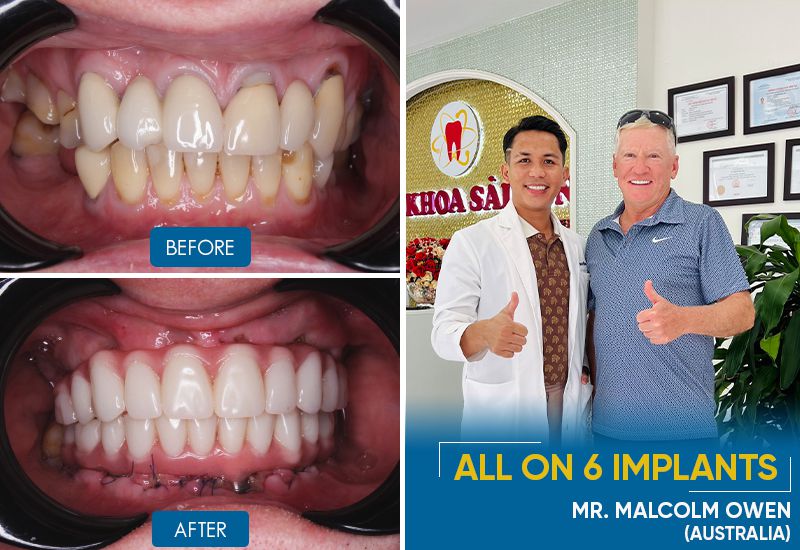
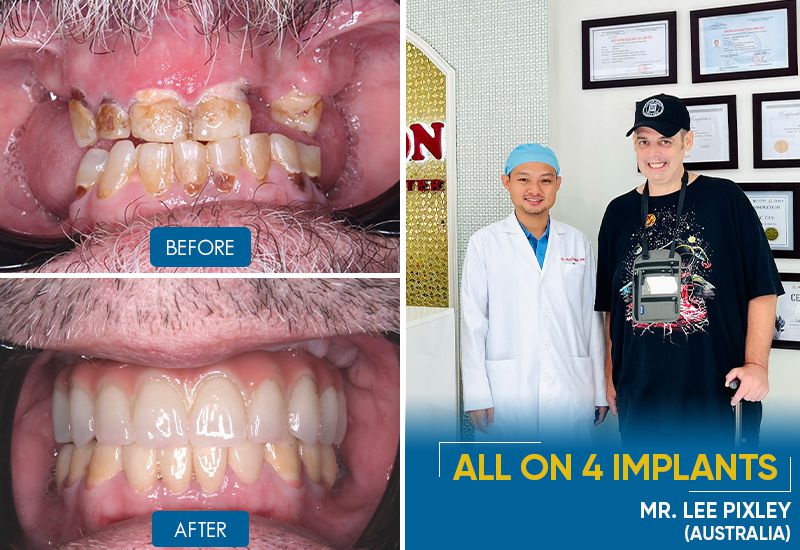
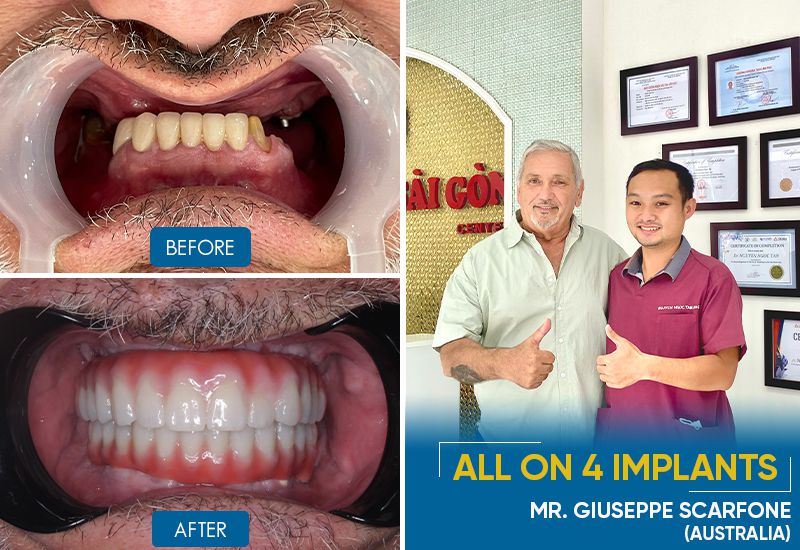
Increased confidence
The psychological impact of tooth loss can be immense, leading to feelings of embarrassment and self-consciousness. Many individuals struggle to engage socially due to concerns about their missing teeth or ill-fitting dentures.
Whole mouth dental implants address these emotional challenges head-on. By restoring a beautiful and functional smile, patients experience a renewed sense of confidence. This boost in self-esteem encourages more active participation in social activities, ultimately leading to an enhanced quality of life.
Moreover, the commitment to oral health represented by investing in implants reinforces a positive self-image, underlining the importance of personal well-being.
Long-Term durability
Among the myriad benefits of full mouth dental implants, their long-term durability stands out as a noteworthy advantage.
With proper oral hygiene and regular dental checkups, these implants can last a lifetime. This remarkable longevity makes them a smart investment compared to dentures or bridges, which often require frequent replacements and adjustments.
The durability of implants also alleviates concerns related to ongoing maintenance and repairs commonly associated with other tooth replacement options. Patients can enjoy peace of mind knowing that, with diligent care, their implants will continue to serve them effectively for years to come.
Considerations for full mouth dental implants
While full mouth dental implants offer a plethora of benefits, it is essential to consider certain factors before proceeding with the procedure. Awareness of these considerations can aid in making informed decisions and preparing adequately for the journey ahead.
Cost
One consideration that often weighs heavily on prospective patients is the cost associated with full mouth implants. The total investment can vary based on several factors, including the number of implants required, the complexity of the case, and the geographical location of the dental practice.
However, while the upfront costs may seem substantial, it is vital to view implants as a long-term investment in your health and well-being. The durability and low maintenance requirements of implants make them a cost-effective solution over time, especially when compared to dentures or bridges that necessitate routine replacements.
Oral Health and Hygiene
Maintaining excellent oral hygiene is crucial for the success of the implants. After receiving full mouth implants, patients must commit to regular brushing, flossing, and professional dental cleanings to prevent infections and ensure the longevity of the implants.
Unlike natural teeth, implants do not succumb to decay, but the surrounding gums can still be vulnerable to infection—known as peri-implantitis—which can jeopardize the implants’ success. Adopting a rigorous oral care routine is essential to safeguarding your new smile.
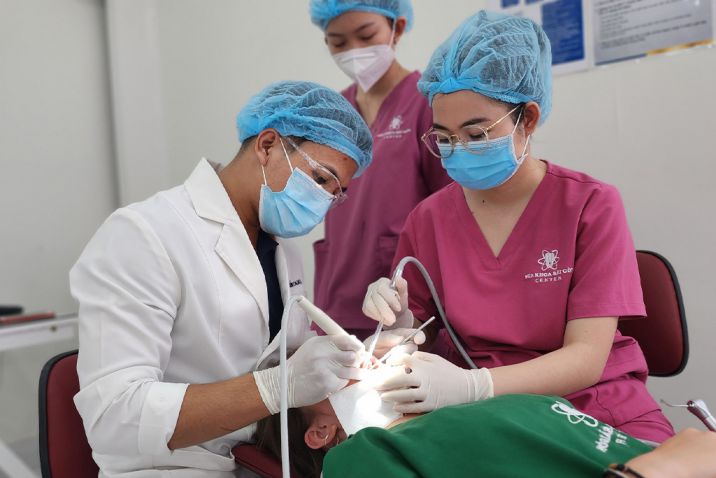
Jawbone Density
The density and health of your jawbone play a vital role in determining the success of the implant procedure. Insufficient bone mass can complicate the implantation and may necessitate bone grafting to strengthen the jawbone prior to implant placement.
A thorough evaluation of jawbone health during the initial consultation phase allows the dentist to devise an appropriate treatment strategy. This preemptive measure is essential for ensuring the optimal success of the implants.
Medical Conditions
Certain medical conditions, such as diabetes or uncontrolled gum disease, may increase the risk of complications during and after the procedure. It is essential to be open and honest with your dentist about any medical conditions you may have to ensure a safe and effective treatment plan.
Your dentist may consult with your primary healthcare provider to assess the potential impact of these conditions. By doing so, they can tailor the treatment plan to accommodate your needs and minimize risks.
Conclusion
Whole mouth dental implants represent a remarkable advancement in dental technology, offering a transformative solution for individuals who have lost most or all of their teeth. Through comprehensive procedures that restore both function and aesthetics, these implants empower patients to regain their confidence and improve their quality of life.
By standing above traditional options like dentures and bridges, full mouth dental implants deliver unparalleled stability, functionality, and longevity. Although considerations such as cost, oral hygiene, jawbone health, and medical conditions should be carefully evaluated, the overwhelming benefits far outweigh the challenges.
With the right preparation and a commitment to oral health, patients can embark on a journey that leads to a radiant smile and a fulfilling life filled with confidence and joy. In the world of dental restoration, full mouth implants are indeed a beacon of hope for those seeking to reclaim their smiles and their lives.

 Google Reviews
Google Reviews Call
Call
SAIGON IMPLANT CENTER
Best dentist in Vietnam
Saigon Implant Center - Dental Clinic utilizes the latest technology for specialized treatment in the field of Single implant, full jaw implants, All on 4 implants, All on 6 implants, Zygoma implant....
SAIGON IMPLANT CENTER
Best dentist in Vietnam
Saigon Implant Center - Dental Clinic utilizes the latest technology for specialized treatment in the field of Single implant, full jaw implants, All on 4 implants, All on 6 implants, Zygoma implant....